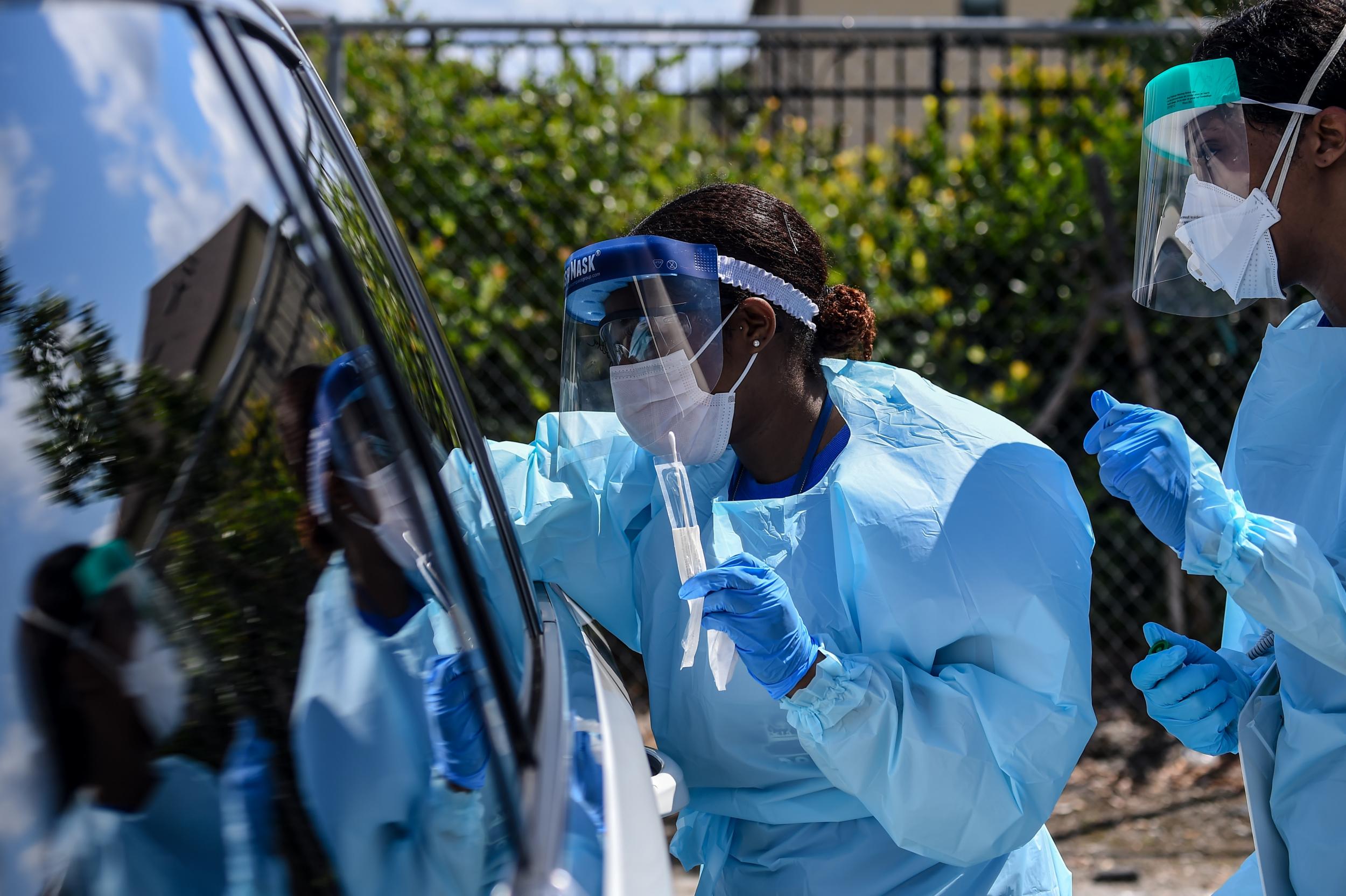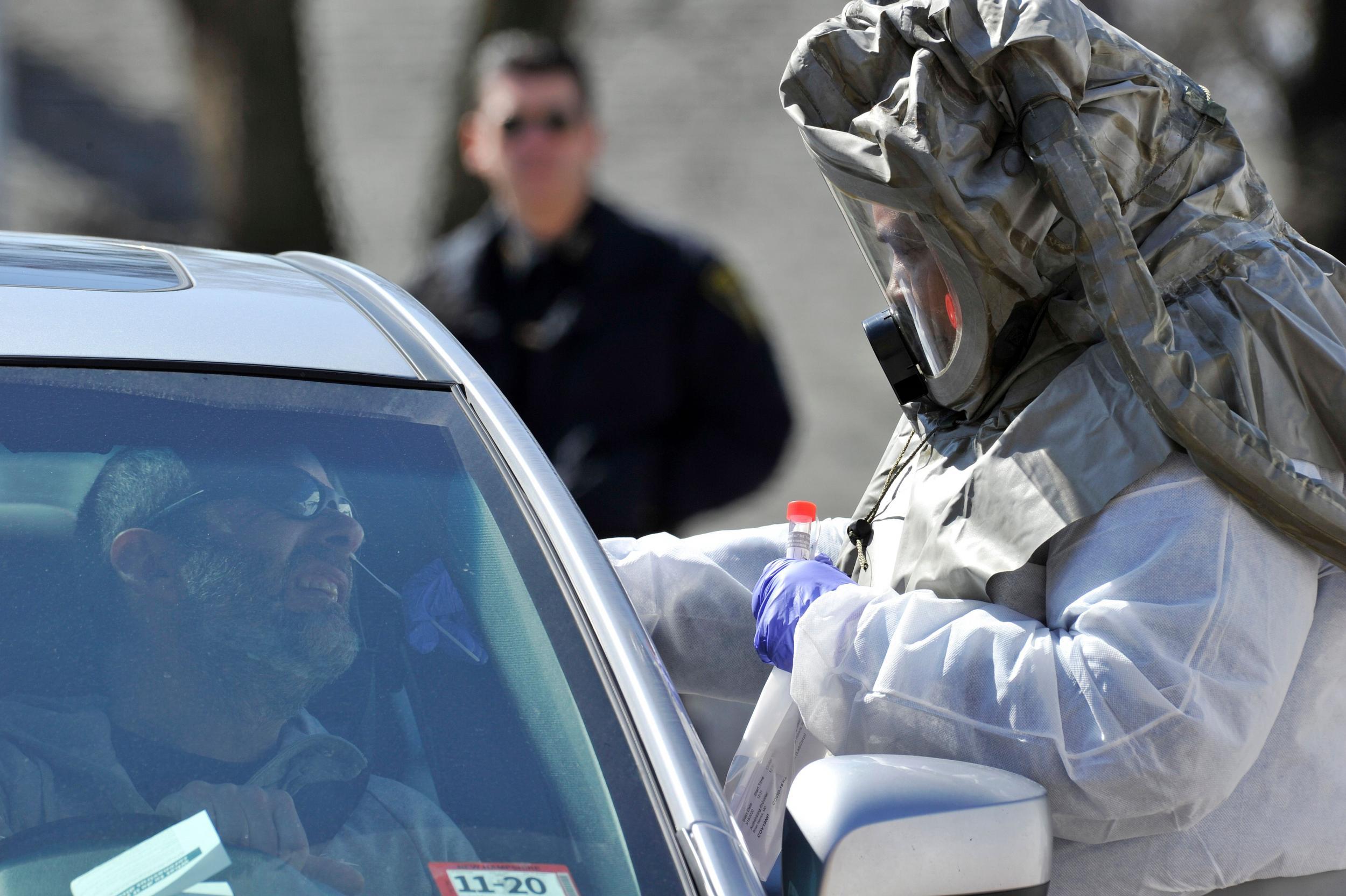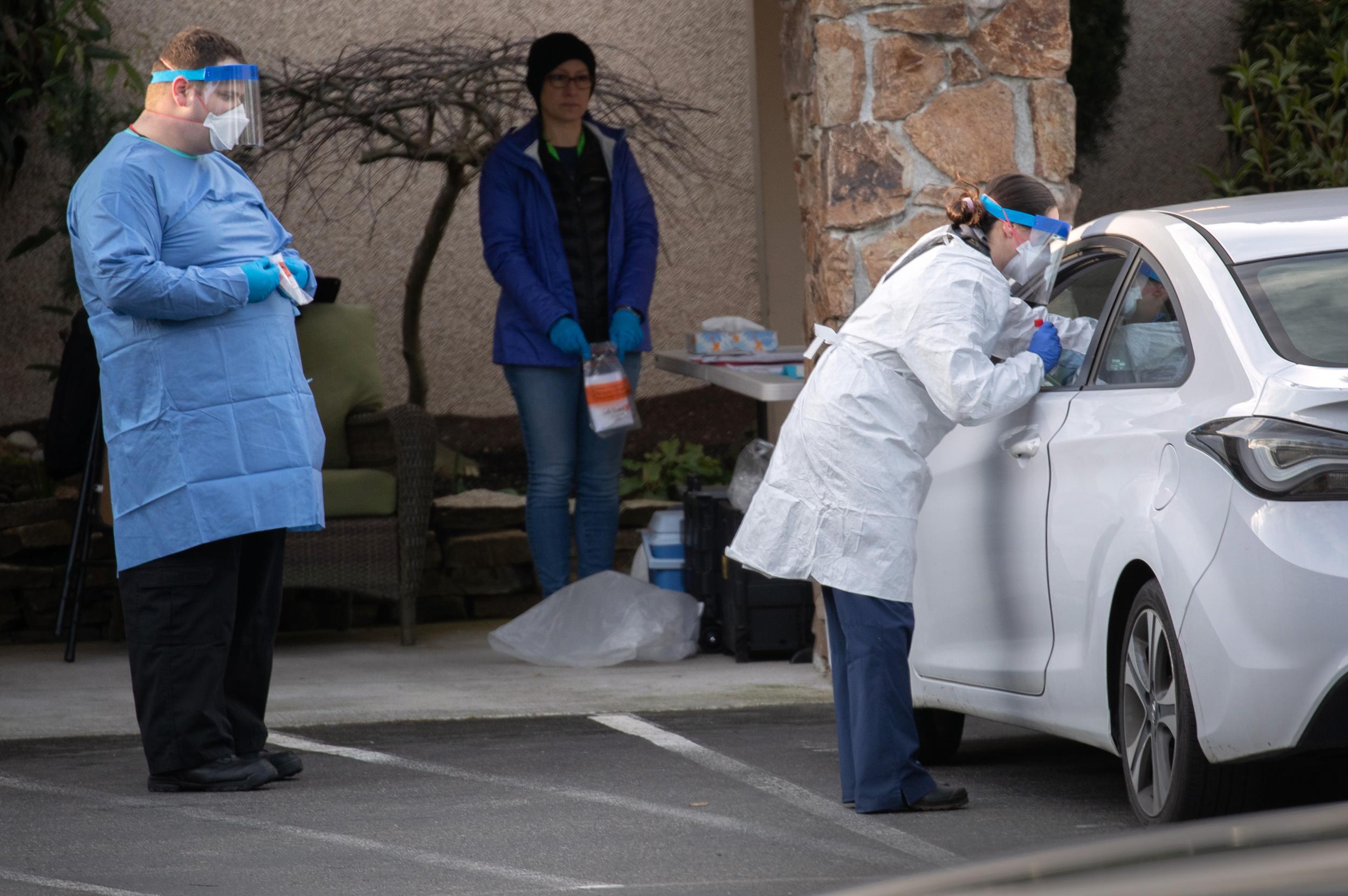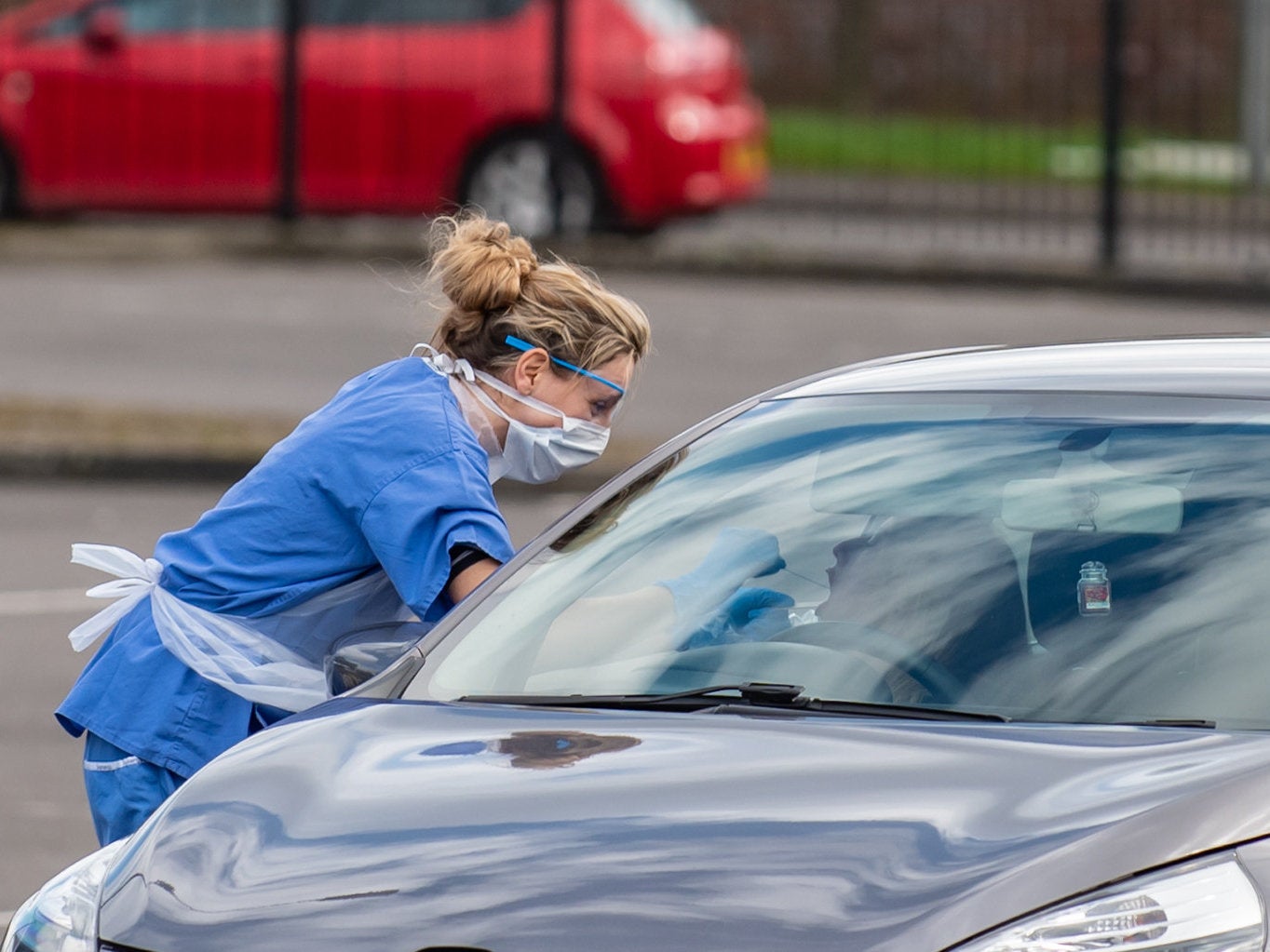Coronavirus: Drive-thru testing sites promised by Trump administration nowhere to be seen
Burden of organising and operating these testing sites falls to state and local governments
Your support helps us to tell the story
From reproductive rights to climate change to Big Tech, The Independent is on the ground when the story is developing. Whether it's investigating the financials of Elon Musk's pro-Trump PAC or producing our latest documentary, 'The A Word', which shines a light on the American women fighting for reproductive rights, we know how important it is to parse out the facts from the messaging.
At such a critical moment in US history, we need reporters on the ground. Your donation allows us to keep sending journalists to speak to both sides of the story.
The Independent is trusted by Americans across the entire political spectrum. And unlike many other quality news outlets, we choose not to lock Americans out of our reporting and analysis with paywalls. We believe quality journalism should be available to everyone, paid for by those who can afford it.
Your support makes all the difference.Two weeks ago, Donald Trump promised a network of drive-thru Covid-19 testing sites across the country where people could be tested “very safely, quickly and conveniently”.
In a Rose Garden news conference, chief executives of Target, Walgreens, Walmart and CVS said they would work with the government to provide space in store parking lots.
While the four retailers have a combined 26,400 US stores, this vision of a proliferation of coronavirus testing sites has yet to materialize.
Walgreens and CVS have opened one site each, while Walmart last weekend opened two drive-thru testing locations near Chicago. Target hasn’t opened any. Rite Aid, which joined the effort later, has opened one drive-thru facility in Philadelphia.
Like much of the nation’s coronavirus response, the burden of organising and operating these testing sites has fallen to state and local governments. On occasion, they’ve enlisted the help of private industry.
But an array of logistical challenges, ranging from a shortage of testing supplies to funding, has meant only a small fraction of Americans can get diagnosed for Covid-19 in a way that is routine in South Korea and elsewhere.
“We have to change how we are approaching this, or we will just hope that people will stay isolated or pay attention, said Garrett Contreras, the fire chief in the Bay Area city of Hayward, who managed to launch a testing site Monday after he personally appealed to scores of pharmaceutical companies to provide equipment.
“I mean, how did some knucklehead fire chief from Hayward find a lab? It’s just wrong.”
A senior administration official, speaking anonymously to share internal deliberations, said the administration’s initial drive-thru testing ambitions had to be scaled back because of the lack of tests nationwide.
Another initial challenge was trying to minimise long lines at the drive-thru testing sites, this official added, so the sites were encouraged to use their own discretion to filter individuals, such as limiting tests only to first responders and medical professionals.
Now that the Food and Drug Administration has approved some self-swabbing kits, the official added, retailers are working those kinds of tests into their planning.
In a statement on Friday, Health and Human Services assistant secretary for health Brett Giroir said federal officials have been “actively involved in dozens” of mobile sites across the US, providing supplies or personnel to roughly 30 of them.
“Four private sector partners – Walgreen’s, Walmart, CVS and Rite-Aid – have successfully launched prototype sites in a period of days. We are working closely with these retailers now to explore the expansion of testing sites across the county, now further enabled by the nasal self-swabbing technique recently approved by the FDA,” he said.

How that will play out is unclear. In recent days, the FDA has been allowing individuals to use short swabs to collect samples from the front of their nostrils – but only at drive-thru testing sites, hospital parking lots, emergency rooms and clinics where they are handed the swab by a healthcare worker, then hand it back.
California, one of the hardest-hit states in the outbreak, has at least half a dozen mobile sites, but not at big-box stores.
Verily, the life sciences company that is a division of Google-parent Alphabet, has launched four of them. Potential patients can fill out the company’s online screener, and if they meet eligibility requirements – including exposure to cases of coronavirus, at-risk locations or occupations, symptoms, previous health conditions or age – they will be directed to one of four drive-thru testing sites in San Mateo, Sacramento, Riverside, and Santa Clara counties.
According to a YouTube video the company posted, people who take the drive-thru tests will have to roll down their windows and be asked to tilt their heads back for a nasal swab. Results should be expected in several days and are processed by Quest. If a person is positive, they will receive a phone call from a doctor. Otherwise, they will receive an email. The company has tested 1,200 people so far.

Dozens of states have mobile testing sites up and running, including Alaska, Connecticut, Florida, Hawaii, Idaho, Illinois, Kentucky, Pennsylvania, Mississippi, Nebraska, New Jersey, Oklahoma, Rhode Island, Tennessee, Utah, Vermont, Washington and Wisconsin.
Most states have just a handful of locations, though Connecticut has at least 26 and is continuing to add more. The bulk of those testing stations are at local hospitals.
Elsewhere, drive-thru sites range from Detroit’s state fairgrounds to Honolulu’s Kakaako Waterfront Park and Waipio Peninsula Soccer Complex.
Many state efforts have been hampered by the lack of tests. Three mobile Nashville, Tennessee, sites have been ready to receive patients for a week, but they’ve been unable to open due to an ongoing lack of test materials. One of them will open Monday.
Kentucky’s first drive-thru testing station started up on Thursday, testing about a dozen people. With limited tests and the state’s lab analysis backed up for two weeks, the governor has said he hopes to open up more sites next week.

Tests at the four drive-thru retail locations so far are limited to first responders and healthcare workers and are not available to the general public.
CVS said its nurses are administering about 200 tests a day in a store parking lot in Shrewsbury, Massachusetts, and it has appointments scheduled through next week.
“We have not announced any additional sites, and continue to communicate closely with the administration and state officials on the best path forward,” spokesman Joe Goode said.
Walmart said it can administer up to 150 tests per day at each of its two drive-thru locations. Spokeswoman Marilee McInnis said the company is in talks with multiple states to expand testing, though she declined to say which ones.

At Walgreens, spokesman Phil Caruso said the company is working closely with the Trump administration, as well as the Centres for Disease Control and Prevention, and Centres for Medicare and Medicaid Services to identify new testing sites. The government is providing supplies and protective gear, he said, while tests are being administered by Walgreens pharmacists and federal health officials.
Target is also waiting for local and state officials to move forward.
“We stand committed to offering our parking lot locations and supporting their efforts when they are ready to activate,” spokeswoman Jessica Carlson said in an email.
For states like Oklahoma, which has stood up drive-thru testing stations in its two biggest cities and is working to put other mobile sites throughout more rural areas, big-box stores are not essential.
In a phone interview on Friday, Oklahoma health secretary Jerome Loughridge said officials had “flashed up” test sites in two rural counties for 48 hours at the start of the week and then put the local health departments in charge. Next week, it would stand up two more mobile sites in counties in the far western part of the state.
“Now we’re able, when we get a flashpoint in a rural community, we can very quickly spin up these satellite locations,” Mr Loughridge said, adding that by shifting counties, “It allows us to get discrete samples from different populations".
Oklahoma officials haven not had to seek out help from major retailers, he said.
“While others might have constrained space, we have the benefit of wide open spaces," he added.
Mr Contreras, the fire chief in Hayward, had a harder time devising a way for his low-income community to get tested. After realising major testing firms were inundated, he sent hundreds of emails and LinkedIn messages to CEOs of pharmaceutical firms, start-ups and genetic testing firms over a single weekend.
“I sent the same message to everyone one of them, a plea to help us get something started,” he said.
He got a response from the CEO of Avellino Labs, a small Menlo Park-based company specialising in eye disease testing. Avellino had developed a test for its South Korean employees as far back as January, and it had just been approved by the Food and Drug Administration.
Mr Contreras asked his city manager for $500,000, and several days later testing began in several tents in a public park next to an old fire station. Results from Monday’s operation show that of the 207 people who were tested, 50 tested positive for the virus.
“There just isn’t a solid plan for how to approach this from the federal level, and that creates a lot of confusion,” he said. “So I quickly tried to become a student of the failures and success stories of the world, like in Italy and Spain, and quickly realised that the Singapore and Taiwan model – suppression through isolation and testing – is the way to go.”
The Washington Post

Join our commenting forum
Join thought-provoking conversations, follow other Independent readers and see their replies
Comments